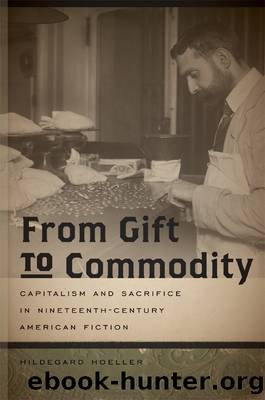From Gift to Commodity by Hildegard Hoeller

Author:Hildegard Hoeller
Language: eng
Format: epub
Publisher: University Press of New England
Conclusion: Capitalism and the (African) American Canon
* * *
âWhere in the World is William Wells Brown?â asks Ann DuCille in her reflection on the âDNA of African-American Literary History.â âThe trouble with Clotel as an originary African-American novel,â she concludes, is that it âhas never been true, authentic, and certifiably âblack.â Often historically inaccurate and heavily dependent on the borrowed conventions of âwhiteâ sentimental fiction Clotel has never quite walked the party line of black experienceâ (DuCille 2000, 453). DuCille is pointing out that the African American canon is still measuring African American writing against values that Brown began to doubt and deconstruct in the nineteenth century by reexamining and exposing the âtrueâ bloodlines of America â itâs money. âDespite its seminal position as the first novel by an African-American,â she writes, âClotel remains a book in need of both readings and re-readings, an originary, enabling text in want of analysis and deep theorizing â perhaps in want even of a traditionâ (443). Brown himself, I have argued, provides such a âtheorizingâ frame when he links his changing writerly practices and his revisions of the slave narrative to a move away from the gift and toward finance capitalism. These changes, while engendered by and true to the American economy, made him into an American writer who became virtually uncanonizable.36 Brownâs new genre of writing, his shinplaster fiction, mirrored the monetary practices of American life and to this day fails the test of authenticity DuCille mentions as integral still to our consideration of African American writing.
But why, Brown seems to ask us, should American writing be any more backed than American money? Perhaps the American writer, Brown suggests, like the American banker, circulates not truth or fiction but shinplaster fiction. Brownâs deconstruction of the border line between fiction and truth is a commentary on and a corollary to Americaâs economy. Those economic realities, which shape our view of human lives, make almost impossible sympathy, trust, and the gift â the foundational elements for sentimental and abolitionist writing and the basis that panic fiction tried to reestablish by insisting on its truthfulness (Sanchez 2008, 31). Instead, as Ernest puts it, Brown is âvery much a practitioner of the poetics of the discourse of distrustâ (2004, 333). The America that emerges from Brownâs writing is one that is radically secular, capitalist, run by worthless paper, incapable of valuing human life, and absurd, making us hover between laughter and tears. The writing that results from such an America, in turn, is like shinplasters themselves, a doubtful currency, unbacked, fictional, yet real, and involving us â as Melvilleâs 1857 novel The Confidence-Man would a few years later â in an endless cycle of distrust, trust, and speculation.
As popular as Uncle Tomâs Cabin was in Britain, it created unease in America precisely because it exposed America and its slavery system to the world. Brownâs Clotel does the same and more. A transatlantic writer, Brown used his presence in Britain as a way to expose America: its slavery, its economy, its disregard for human lives, and its shaky and hypocritical foundations.
Download
This site does not store any files on its server. We only index and link to content provided by other sites. Please contact the content providers to delete copyright contents if any and email us, we'll remove relevant links or contents immediately.
4 3 2 1: A Novel by Paul Auster(12393)
The handmaid's tale by Margaret Atwood(7767)
Giovanni's Room by James Baldwin(7346)
Asking the Right Questions: A Guide to Critical Thinking by M. Neil Browne & Stuart M. Keeley(5775)
Big Magic: Creative Living Beyond Fear by Elizabeth Gilbert(5774)
Ego Is the Enemy by Ryan Holiday(5450)
The Body: A Guide for Occupants by Bill Bryson(5098)
On Writing A Memoir of the Craft by Stephen King(4944)
Ken Follett - World without end by Ken Follett(4734)
Adulting by Kelly Williams Brown(4574)
Bluets by Maggie Nelson(4559)
Eat That Frog! by Brian Tracy(4540)
Guilty Pleasures by Laurell K Hamilton(4450)
The Poetry of Pablo Neruda by Pablo Neruda(4109)
Alive: The Story of the Andes Survivors by Piers Paul Read(4033)
White Noise - A Novel by Don DeLillo(4012)
Fingerprints of the Gods by Graham Hancock(4004)
The Book of Joy by Dalai Lama(3986)
The Bookshop by Penelope Fitzgerald(3854)
